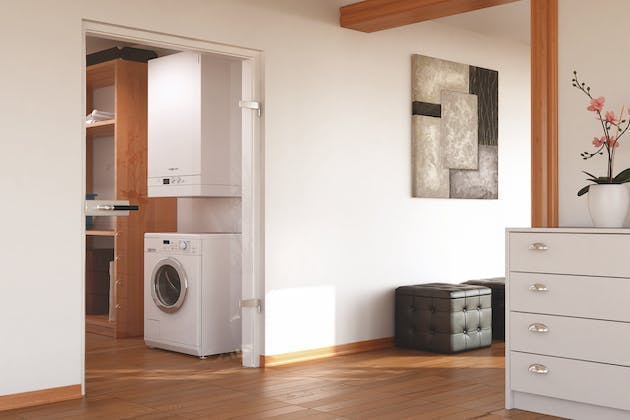Living in Southampton, Basingstoke, Portsmouth and Andover means we rely heavily on our boilers for warmth and hot water throughout the year. Understanding common boiler issues can help you identify problems early and avoid costly breakdowns.
If you would like to get an expert opinion on your boiler, please get in touch with us by calling us on 07732 785867 and we'll be happy to help.
Top 10 Common Boiler Problems

Leaking Boiler
A leaking boiler is a serious issue that requires immediate attention. Leaks often stem from internal component failures, such as faulty pressure valves or worn pump seals. High system pressure can also force water out through the pressure relief valve.
To address this problem, first identify the leak source. If it's a minor issue like a loose connection, tightening it might suffice. However, internal component failures typically require professional intervention. A Gas Safe engineer can replace faulty parts and adjust system pressure to prevent future leaks.
Low Boiler Pressure
Low boiler pressure is a common issue that can result in inefficient heating. Causes include system leaks, a faulty pressure gauge, or recent radiator bleeding. You can identify this problem by checking the pressure gauge on your boiler; it should typically read between 1 and 1.5 bar.
To resolve low pressure, first inspect your system for visible leaks. If none are found, try repressurising the system using the filling loop. If the pressure drops again quickly, or if you're unsure about the process, consult a professional to diagnose and fix the underlying issue.
No Heating or Hot Water
When your boiler fails to provide heating or hot water, it can be due to various factors. Common causes include low water pressure, a faulty thermostat or diverter valve, a frozen condensate pipe, or internal component failure.
Start by checking your boiler's pressure and ensuring it's within the correct range. Verify that your thermostat is set correctly and functioning. If these basic checks don't resolve the issue, you may need to call a professional to inspect internal components like the diverter valve or heat exchanger.
Frozen Condensate Pipe
In cold weather, the condensate pipe can freeze, causing your boiler to shut down. This pipe carries acidic water away from the boiler, and if it freezes, the water can't escape, triggering a safety cut-out.
To thaw a frozen condensate pipe, pour warm (not boiling) water over it or use a hot water bottle. Once thawed, reset your boiler. To prevent future freezing, ensure the pipe is well-insulated, especially in exposed areas.
Radiator Faults
Cold or partially cold radiators often indicate air in the system, sludge buildup, or faulty thermostatic radiator valves (TRVs). These issues can lead to uneven heating and reduced efficiency.
Bleeding your radiators can remove trapped air. If this doesn't solve the problem, your system may need powerflushing to remove sludge. Faulty TRVs should be replaced to ensure proper heat control.
Boiler Not Responding
If your boiler fails to start, it could be due to power supply issues, a faulty control system, or a dirty burner. First, check that the boiler is receiving power and that the programmer and thermostat are set correctly.
If power isn't the issue, the problem may lie with the control system or burner. These components require professional inspection and cleaning or replacement if necessary.
Pilot Light Issues
In older boilers with a permanent pilot light, issues can arise if the flame goes out. This may be due to a faulty thermocouple, gas supply problems, or a dirty pilot light assembly.
If you're comfortable and trained to do so, you can try relighting the pilot light following the manufacturer's instructions. However, if it won't stay lit or you smell gas, turn off the boiler and contact a Gas Safe engineer immediately.
Internal Component Failure
Various internal components can fail due to wear and tear or poor maintenance. These include the pump, heat exchanger, or printed circuit board (PCB). Symptoms vary depending on the affected component but may include no heat, strange noises, or complete system shutdown.
Internal component failures usually require professional diagnosis and repair. Regular servicing can help prevent these issues by identifying potential problems early.
Boiler Making Strange Noises
Unusual noises from your boiler can indicate several issues. Banging or kettling sounds often suggest limescale buildup on the heat exchanger. Gurgling noises may indicate air in the system, while a loud humming could signify a faulty pump.
Bleeding radiators can resolve air-related noises. For limescale issues, a chemical flush may be necessary. If the pump is the culprit, it may need replacement.
Boiler Overheating
Boiler overheating can be caused by a faulty thermostat, poor water circulation, or limescale buildup. This issue is serious as it can lead to component damage and potential safety risks.
Check that your thermostat is working correctly and set to an appropriate temperature. Ensure there's proper water circulation by checking for blockages or airlocks. If the problem persists, a professional should inspect for limescale buildup and perform a system flush if necessary.
Speak with professional hearing engineers in Southampton, Portsmouth, Basingtoke and Andover
For more information on boiler issues, get in touch by calling us on 07732 785867.



